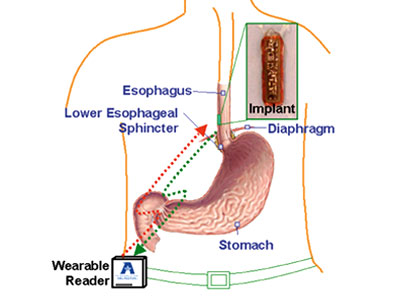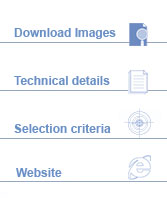|

WT AWARD 2009 - ACCESSIBILITY
BESTTM: Batteryless Endoluminal Sensing Telemeter
University of Texas at Arlington, USA
 |

|
Nuovo sistema per la diagnosi a lungo termine di disturbi gastroesofagei quali la GERD (malattia da reflusso gastroesofageo). Consiste nell’impianto un microsensore wireless collegato a un lettore esterno indossabile. Il sensore è basato sulla telemetria medica wireless e evita di ricorrere all’introduzione di una sonda attraverso le vie nasali.In questo modo il paziente si sentirà a proprio agio con il sensore impiantato nell’esofago per un lungo periodo di tempo. Il sensore formato da microelettrodi registra i cambiamenti dei livelli di acidità nell’esofago e dall’interno del corpo trasmette all’esterno le informazioni al ricevitore indossabile che a sua volta invia i dati a un computer che li analizzerà. L’innovativo sensore non richiede batterie quindi la sua funzionalità non è limitata nel tempo e le dimensioni sono molto ridotte. Il sistema è in grado di analizzare accuratamente episodi di reflusso acido e non in pazienti che soffrono di disturbi gastroesofagei, con l’obiettivo di curarli con terapie adeguate. Questa diagnosi può potenzialmente prevenire il cancro all’esofago. Il sistema riduce i disagi del paziente e assicura l’assistenza anche quando questi non è ricoverato in strutture sanitarie.
New medical diagnosis system consisting of batteryless wireless sensor implants and a wearable reader for long-term diagnosis of gastroesophageal diseases such as GERD. The sensor is based on wireless telemetry without the requirement of a transnasally tethered wire so the patients will feel comfortable with the implants in their esophagus for a long period of time. Micromachined sensing electrodes, are planted into the esophagus of the patient and record changes in the acidity levels. While in the body, the sensors relay informations wirelessly to a receiver, positioned outside the body, which then sends the data to a computer to be analyzed. The innovative sensor does not require batteries so the measurement time is not limited and the implant size is smaller. Accurately diagnose acid and nonacid reflux episodes in patients with gastroesophageal diseases in order to treat the diseases with proper methods. This can potentially prevents esophageal cancer.
The system provides a cost-efficient and comfortable screening method for out-patient clinics and hospitals.
 |
 |
|
